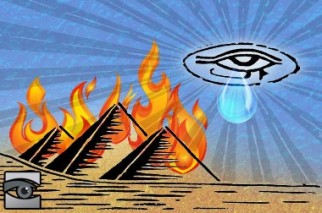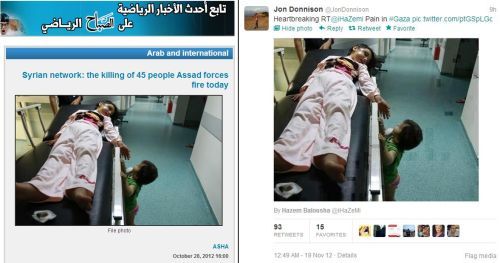August 21, 2013 16:13
by Simon Plosker

Which is just as well because most journalists’ attentions are now trained on Cairo as the Egyptian army deals with the Muslim Brotherhood in a quite brutal manner.
This gives us an opportunity to make some observations concerning the media’s treatment of the issue, the reporting of Israel’s role in the crisis and the differences between this and the coverage of the Israeli-Palestinian conflict.
1. A strange sense of proportion
Headlines such as this from the New York Times:
now find themselves co-existing in the same Middle East sections that are reporting on hundreds of deaths in Egypt. In addition, the death toll from Syria’s brutal civil war is said to have surpassed 100,000.
While we should not demean the loss of any individual human life, events taking place in Israel’s neighborhood perhaps give some perspective and proportion when we consider the enormous amount of coverage Israel receives in the mainstream media.
How many Egyptians, Syrians, Iraqis and others need to die violently before the media and others recognize that the Israel-Palestinian conflict and issues such as Jewish housing construction in Jerusalem are not the fulcrum around which all Middle East conflict revolves?
And while incidents such as the above are legitimately deemed newsworthy, it is noteworthy that individual Palestinian deaths command such coverage irrespective of whether or not the Palestinian involved could be considered a combatant or not. Indeed, the NY Times article refers to B’tselem’s figure of 10 Palestinians killed this year by the military without considering how many of those were terrorists.
2. A false comparison
Time Magazine takes a look at an English-language video released by the Egyptian military to government officials and journalists in Washington meant to explain and justify the army’s actions in recent weeks to the outside world. The article makes the following comparison:
The [Egyptian] generals this week took a page from the Israeli media blitz that surrounded their last Gaza offensive in November and launched some propaganda of their own.
But that’s where the comparison ends. To compare the rather amateurish Egyptian effort to Israel’s professional (and accurate) online presence is insulting. The IDF is way out in front when it comes to getting its messaging out there. Of course, it helps if your message is also a credible one and it looks like the Egyptian army is going to learn very quickly that its apparent lack of restraint isn’t going to play very well to Western audiences.
Perhaps the Western media might also consider taking another look at the IDF’s rather more benign methods of crowd control and dispersal which most definitely do not involve indiscriminate and deliberate shooting at civilians.
3. Bring out the bodies
On the subject of propaganda, here’s something courtesy of The Times of London (subscription-only) that you won’t find happening in Israel:
In our Shattered Lens study of photo bias in the Israeli-Palestinian conflict, we noted how photos of bodies and the imagery of funerals were consistently used by Palestinians for propaganda purposes.
In contrast, Israel does not allow press photographers to take pictures of dead or wounded soldiers or civilians at the scene of an event or in hospitals or morgues unless the photographers happen to be at the scene before the arrival of the emergency services. Even then, editors exercise a level of responsibility over what to publish. Images of Israeli suffering are therefore far less prominent.
In July, the Al Arabiya website reported that the Facebook page of Egypt’s Freedom and Justice Party (FJP) – the political arm of the Muslim Brotherhood – had displayed images of children killed in Syria claiming they were victims of the recent unrest in Egypt.
Sound familiar? It’s not the first time that images of dead Syrian children have been misused.
Early into the 2012 Operation of Pillar of Defense, Palestinian journalist/activist Hazem Balousha tweeted a moving a photo of a girl lying in a hospital gurney, purportedly injured in an Israeli air strike.
BBC reporter Jon Donnison was touched and retweeted it. However, activists discovered that the photo was actually taken in Syria a month before the war.
Why then does the media recognize that bodies are weapons in the Egyptian propaganda war but will not question the same thing when it comes to the Palestinians?
Instead we are treated to images such as that of baby Omar Mishrawi on the front page of the Washington Post and other media outlets.
4. Moralizing over Israel’s interests
Newspaper reports have appeared alleging Israeli lobbying on behalf of the Egyptian military-backed government, including in the New York Times and Wall Street Journal. To the uninformed and those with a low opinion of Israel, this could imply support for the violent actions of the Egyptian army. With a healthy dose of cynicism, Shmuel Rosner responds in the NY Times: “Here we go again. Israel is rooting for another butcher” before spelling out the realities:
Israelis are not immune to being cold-hearted, cynical, hypocritical and racist. But this position is something else. If Israelis are rooting for Egypt’s military, it’s because they want a government next door that will respect the two countries’ peace treaty. And it’s because the military is the only institution in Egypt today that can prevent the Sinai Peninsula from becoming a safe haven for radicalism. Israelis are being pragmatic, and that might look ugly, but that’s what experience has taught them.
Indeed, Israel does not have the luxury of favoring liberal democratic forces over extremists, radicals or authoritarians. In a rough neighborhood you can only pick from the best of a bad bunch.
5. Journalists engaged in propaganda
The Egyptian Independent carries a feature on the polarization and abuse of Egyptian media:
Qutb al-Arabi, assistant secretary general of the Supreme Council of Journalism, said that he knows of some newspapers that refrained from publishing some writers’ articles for opposing their owners’ political affiliations, others banned media professionals from TV shows so as not to express the other point of view.
Jaqueline Zaher of DPA believes that the Egyptian media have become “vessels” for political powers.
“Authentication and double-checking news are not on the table for many of them. Rumors and half-leads were considered okay to publish or air,” she said. “This was either due to an avarice to publish more news to feed the audience that is always hungry for information, or, in most cases, to serve political agendas of the media owners.”
Al-Arabi also said that anonymous sources have run rampant in Egyptian media, making it easy for some newspapers to get away with inaccurate news.
Media outlets private and state-owned are steamrolling moderate, unpolarised opinions and news coverage leaving average Egyptians confused, while those affiliate to either side of Egypt’s political divide complain of media bias or resort to the end of the spectrum that confirms their bias and feed it even more, leaving little room for unbiased reports.
Egyptians are confused and the deep polarisation present in the street proves that few of them are empowered with the tools needed to weigh news before sharing them on social media or even adopting some of the media’s propaganda as personal opinions.
Perhaps Western journalists should stop viewing their Arab colleagues through the lens of Western journalistic practice. There have been plenty of occasions through the years where Palestinian journalists have taken an active role in the conflict beyond that of simply reporting.
Only in the past few weeks we exposed the agenda of Palestinian photojournalist Fadi Arouri who previously worked for Reuters while actively promoting a campaign against normalization of relations with Israel.
In May 2013, the Washington-based Newseum, a museum dedicated to the media, even considered including two Hamas activists who worked for the Hamas Al-Aqsa television network in a ceremony to honor those journalists who have been killed in the last year in the course of covering the news.
But as the Egyptian example as well as the activities of some Palestinian media has shown, simply putting down the word “journalist” as one’s profession doesn’t necessarily equal professionalism.
Source material can be found at this site.













